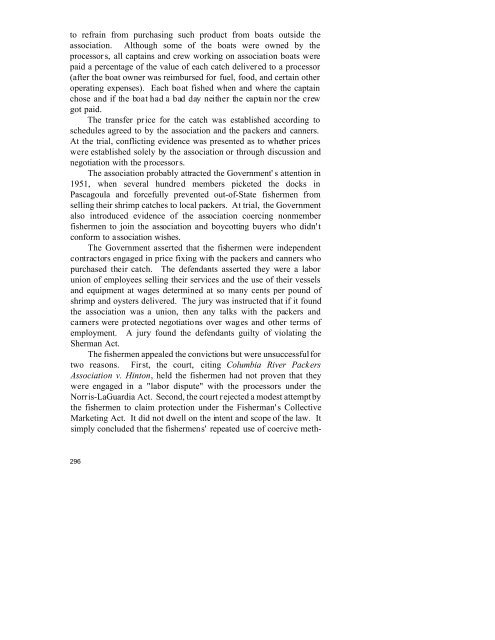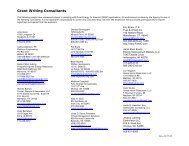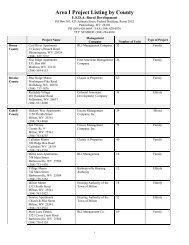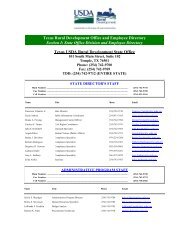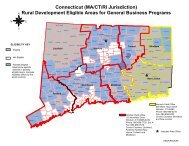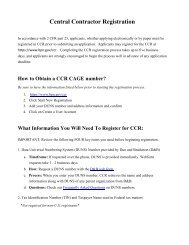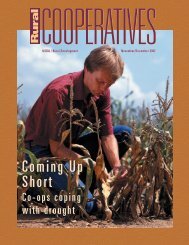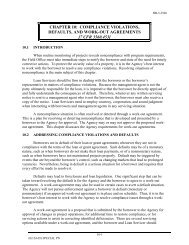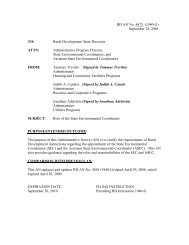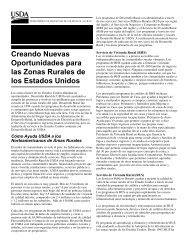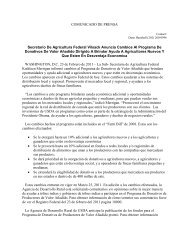- Page 1 and 2:
USDA United States Department of Ag
- Page 3 and 4:
Preface Antitrust law poses a speci
- Page 5 and 6:
Page CHAPTER 3. SHERMAN TO CAPPER-V
- Page 7 and 8:
Page Association Collaboration ....
- Page 9 and 10:
Page APPENDIX C. FEDERAL ANTITRUST
- Page 11 and 12:
CHAPTER 1 HISTORICAL PERSPECTIVE 4
- Page 13 and 14:
Unlike the waterways, these early r
- Page 15 and 16:
250,000. 5 The rapid influx of peop
- Page 17 and 18:
transcontinental service. This new
- Page 19 and 20:
to 800,000 members. One of the Gran
- Page 21 and 22:
faire. Corporate interests wanted t
- Page 23 and 24:
educed such conduct. Railroad conso
- Page 25 and 26:
long as the price received for each
- Page 27 and 28:
However, after the Civil War it fou
- Page 29 and 30:
Then the Alliance rejected the Roch
- Page 31 and 32:
CHAPTER 2. THE SHERMAN ACT As the d
- Page 33 and 34:
legislation introduced as the first
- Page 35 and 36:
produce evils, but if you take away
- Page 37 and 38:
signed into law by President Benjam
- Page 39 and 40:
! Sec. 4 establishes federal court
- Page 41 and 42:
approach for determining which rest
- Page 43 and 44:
it didn't have to examine whether t
- Page 45 and 46:
fresh meat also violated the Sherma
- Page 47 and 48:
of this country.. .are presumed to
- Page 49 and 50:
40 relevant facts. This is not beca
- Page 51 and 52:
(1984). 42 lated industries, in an
- Page 53 and 54:
found price fixing, then they shoul
- Page 55 and 56:
"...to raise or lower prices whatev
- Page 57 and 58:
Thus, the importance of the Capper-
- Page 59 and 60:
Government need not show significan
- Page 61 and 62:
Group boycotts were formally tabbed
- Page 63 and 64:
AP. The United States sought an inj
- Page 65 and 66:
cooperative provides safeguards suf
- Page 67 and 68:
marketing agreement). The expelled
- Page 69 and 70:
156 Reynolds at 21-22. 157 Joseph G
- Page 71 and 72:
The rapid growth of fluid milk asso
- Page 73 and 74:
the hands of 25 trustees who in tur
- Page 75 and 76:
assertions. Association counsel was
- Page 77 and 78:
In 1891, Illinois enacted a statute
- Page 79 and 80:
A month later, the Alabama Court of
- Page 81 and 82:
CONGRESS RESPONDS TO STANDARD OIL A
- Page 83 and 84:
language recognizing in Federal law
- Page 85 and 86:
As introduced, the provision coveri
- Page 87 and 88:
194 Id. Rep. Volstead was, at this
- Page 89 and 90:
200 51 Cong. Rec. 9568 (1914). 201
- Page 91 and 92:
When the bill reached the Senate, i
- Page 93 and 94:
that, unless they ceased dealing wi
- Page 95 and 96:
Virginia opinion, the Supreme Court
- Page 97 and 98:
CHAPTER 4. THE CAPPER-VOLSTEAD ACT
- Page 99 and 100:
90 price of any agricultural produc
- Page 101 and 102:
The Court then concluded that proce
- Page 103 and 104:
Republican from Kansas, Senator Art
- Page 105 and 106:
96 Section 1 defines and limits the
- Page 107 and 108:
244 59 Cong. Rec. 7852 (1920). The
- Page 109 and 110:
100 the tax in transit, and the con
- Page 111 and 112:
! The Federal Trade Commission woul
- Page 113 and 114:
261 Id. 262 60 Cong. Rec. 369 (1920
- Page 115 and 116:
106 them. There were no storage fac
- Page 117 and 118:
The Senate immediately requested a
- Page 119 and 120:
110 considers the duties and the or
- Page 121 and 122:
280 Id. 281 61 Cong. Rec. 1043 (192
- Page 123 and 124:
114 and adopted by the Senate to a
- Page 125 and 126:
Senator Kellogg, in his role as flo
- Page 127 and 128:
118 statistics and he, through his
- Page 129 and 130:
120 commerce. This provision of sec
- Page 131 and 132:
122 creameries... .but they are not
- Page 133 and 134:
Committee hearings general agreemen
- Page 135 and 136:
Debate continued the following day,
- Page 137 and 138:
admitted to membership in the assoc
- Page 139 and 140:
321 Id. 322 62 Cong. Rec. 2281 (192
- Page 141 and 142:
the same basis as to organization o
- Page 143 and 144:
unit' s first publication was L. S.
- Page 145 and 146:
The House Agriculture Committee Rep
- Page 147 and 148:
Two important issues arose during t
- Page 149 and 150:
On the last day of Senate hearings,
- Page 151 and 152:
Committee (without the reference to
- Page 153 and 154:
The only Congressional debate on th
- Page 155 and 156:
terms than others in the same marke
- Page 157 and 158:
394 The influence of the nonstock a
- Page 159 and 160:
contained a provision in effect exp
- Page 161 and 162:
strike down the entire law in Conno
- Page 163 and 164:
This chapter begins with detailed c
- Page 165 and 166:
All of the defendants based their d
- Page 167 and 168:
and marketing, in interstate commer
- Page 169 and 170:
First, the Court examined the scope
- Page 171 and 172:
with non-producers such as processo
- Page 173 and 174:
violation. In an unreported opinion
- Page 175 and 176:
appellate court turned to the full-
- Page 177 and 178:
At the time Capper-Volstead was ena
- Page 179 and 180:
Likewise, an absentee owner of a fa
- Page 181 and 182:
statutory "members" and do not stri
- Page 183 and 184:
Two others elements of this decisio
- Page 185 and 186:
exchanges and either pack their own
- Page 187 and 188:
National Egg. 476 The third address
- Page 189 and 190:
The Government conceded all points
- Page 191 and 192:
the scope of agricultural "producer
- Page 193 and 194:
jority of failing to interpret Capp
- Page 195 and 196:
middlemen from price-fixing liabili
- Page 197 and 198:
510 Id., at page 2. 511 United Stat
- Page 199 and 200:
Foods, for processing into grape ju
- Page 201 and 202:
Most producer associations claiming
- Page 203 and 204:
law, and perhaps antitrust law in g
- Page 205 and 206:
Any immediate impact on supply was
- Page 207 and 208:
530 Id. 531 15 U.S.C. § 15. 532 No
- Page 209 and 210:
The judge noted that the law appear
- Page 211 and 212:
cooperative to antitrust liability,
- Page 213 and 214:
organization can develop when these
- Page 215 and 216:
Exchange Lemon, TreeSweet and Silzl
- Page 217 and 218:
Sunkist also challenged the trial j
- Page 219 and 220:
Exchange Act. 563 Bauer counterclai
- Page 221 and 222:
in the committee report, to provide
- Page 223 and 224:
The court found support for its dec
- Page 225 and 226:
policy, making sure the cooperative
- Page 227 and 228:
contractual arrangements with other
- Page 229 and 230:
The second clause offers the option
- Page 231 and 232:
as "predatory" conduct. This sectio
- Page 233 and 234:
Section 1 and 2 claims when the par
- Page 235 and 236:
producers of agricultural commoditi
- Page 237 and 238:
authorized by the Secretary of Agri
- Page 239 and 240:
etween Embassy and Maryland & Virgi
- Page 241 and 242:
United States v. King. 634 Case law
- Page 243 and 244:
Several private cases alleging pred
- Page 245 and 246:
Further, the cooperative launched a
- Page 247 and 248:
The case was tried before a jury, w
- Page 249 and 250:
move on to another store still doin
- Page 251 and 252:
went into the facts of the case in
- Page 253 and 254: absolute. 667 The last major issues
- Page 255 and 256: 672 119 F. Supp. at 907. Cited with
- Page 257 and 258: monopoly power. It is the wrongful
- Page 259 and 260: In 1960, producer associations in D
- Page 261 and 262: were free to sell to whomever they
- Page 263 and 264: exceeded demand. NFO made essential
- Page 265 and 266: Justice also asserted AMPI engaged
- Page 267 and 268: days notice. The court noted that m
- Page 269 and 270: DI. 701 The practice was suspended
- Page 271 and 272: The cooperatives appealed to the U.
- Page 273 and 274: different premiums in different mar
- Page 275 and 276: cover more than half of DI's reques
- Page 277 and 278: properly was a matter of contract l
- Page 279 and 280: 727 GVF Cannery v. California Tomat
- Page 281 and 282: monopolize the fluid milk market in
- Page 283 and 284: 741 687 F. 2d at 1183. But in a sub
- Page 285 and 286: 3. Mid-Am and AMPI threatened to su
- Page 287 and 288: USDA Enforcement In Section 2, Cong
- Page 289 and 290: separated from USDA' s activities t
- Page 291 and 292: Barriers to entry into the producti
- Page 293 and 294: A Federal district court judge reje
- Page 295 and 296: evidence in the record supported th
- Page 297 and 298: 781 1983-2 Trade Cases (C CH) at 68
- Page 299 and 300: the mechanism of a producer associa
- Page 301 and 302: educed. This is not the type of inj
- Page 303: Columbia River, challenging the con
- Page 307 and 308: Sunkist and Reliance violated secti
- Page 309 and 310: cooperative. The Department of the
- Page 311 and 312: cultural producers, have the benefi
- Page 313 and 314: Sewell claimed damages in excess of
- Page 315 and 316: Sewell II. When the court decided t
- Page 317 and 318: 308 pricing its product at or just
- Page 319 and 320: According to the decision, Agmax co
- Page 321 and 322: issues such as "what is a producer?
- Page 323 and 324: The opinions supporting the dismiss
- Page 325 and 326: for failure to state a claim under
- Page 327 and 328: its marketing agreements. Plaintiff
- Page 329 and 330: CHAPTER 8: IN CONCLUSION, A LOOK TO
- Page 331 and 332: commercializing innovations on at l
- Page 333 and 334: The agreement enjoins DFA and Kelle
- Page 335 and 336: Appendix A. Cooperative Antitrust C
- Page 337 and 338: 328 Pages Castorland M ilk & Cheese
- Page 339 and 340: 330 Pages Isaly Dairy Company v. Un
- Page 341 and 342: 332 Pages North Texas Producers Ass
- Page 343 and 344: 334 Pages Whitney v. National Grape
- Page 345 and 346: 336 SECON D CIRC UIT Pages Agritron
- Page 347 and 348: 338 Pages National Broiler Marketin
- Page 349 and 350: 340 EIGHT H CIRC UIT Pages Alexande
- Page 351 and 352: 342 Pages Northern California Super
- Page 353 and 354: Appendix C. Federal Antitrust Statu
- Page 355 and 356:
should not be entered by the Commis
- Page 357 and 358:
348 CLAYTON ACT 38 Stat. 730 (1914)
- Page 359 and 360:
(2) The court shall award the State
- Page 361 and 362:
352 CAPPER-VOLSTEAD ACT 42 Stat. 38
- Page 363 and 364:
injunction or other appropriate rem
- Page 365 and 366:
(2) To conduct studies of the econo
- Page 367 and 368:
358 FISHERMEN'S COLLECTIVE MARKETIN
- Page 369 and 370:
to be had in considering such order


